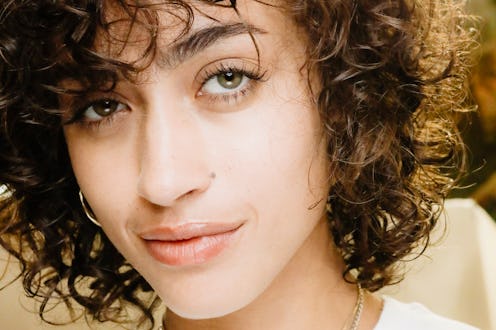(Beauty)
Taking Prenatal Vitamins For Hair Growth Is Maybe Not Such A Good Idea After All

A friend recently recounted a very funny story about prenatal vitamins. She — a not-pregnant 30-something — bought a bottle for the purported hair, skin, and nail benefits and left said bottle out on her kitchen counter, where her partner later found it. He (rightfully) freaked out; hilarity ensued. I didn’t laugh. Ingestible-beauty enthusiast that I am, I stopped listening at “hair, skin, and nail benefits.” Was this the hair growth hack my stunted strands had been missing — and can you use prenatal vitamins when you're not pregnant?
Read more: How Microneedling For Hair Loss Leads To A Head Full Of Healthy Hair
After a delayed “ha ha” and a quick apology for being a bad, beauty-obsessed friend, I shot off an email to my favorite dermatologist, Dr. Devika Icecreamwala, M.D., F.A.A.D., with Icecreamwala Dermatology in San Francisco. “Is there any nutrient in a typical prenatal vitamin that would actually help hair grow longer and stronger?” I asked. Yes, she says, but there's a catch: The levels of certain nutrients in prenatal vitamins could also cause issues for someone who's not actually pregnant, including kidney stones and constipation.
“Prenatal vitamins are specifically formulated to meet changing nutrient needs when you’re pregnant, thinking about getting pregnant, or actively trying,” Dr. Mastaneh Sharafi, Ph.D., R.D., the Director of Scientific Affairs with women’s vitamin brand Ritual, tells The Zoe Report. “As an example, our Essential Prenatal contains choline, which helps support brain development, and a vegan-certified Vitamin D3, which helps support immune function.” It’s a classic case of “too much of a good thing:” Nutrients are obviously, well, nutritious — but only to a point. “Scientific evidence shows that too much of a nutrient can actually be a bad thing depending on your health, age, and whether your body can easily get rid of the excess,” Dr. Sharafi says.
A prime example is folic acid. “Prenatal vitamins have a lot of folic acid, which can help hair grow longer and stronger,” Dr. Icecreamwala says. “However, I do not recommend taking folic acid for long periods of time if you are not pregnant or planning to conceive, because large amounts of folic acid over time can lead to cancer cell development.” Yeah, no good hair day is worth that.
Prenatals also have a hefty amount of biotin, which is known for its health-boosting effects on hair, skin, and nails. It’s also critical to “many bodily functions including gene expression, which your body does a lot of during pregnancy as it’s rapidly creating a lot of new cells for both your body and the baby’s development,” Dr. Sharafi explains. “This is why many prenatal vitamins, including our Essential Prenatal, include extra biotin.” But too much biotin — like, the amount in a prenatal vitamin designed to nourish two eventual human lives instead of one — can actually cause rashes, digestive issues, and kidney problems.
“There is increased iron in prenatal vitamins, which can lead to constipation and stomach upset,” Dr. Icecreamwala adds. “And increased calcium from prenatal vitamins can lead to increased kidney stones.”
Besides, both doctors say, it’s easy to get enough of these two growth-associated nutrients via diet. “You can get an adequate amount of folic acid through your diet if you incorporate specific green vegetables,” Dr. Icecreamwala says. Think: leafy greens, broccoli, asparagus, and beets. “When you’re not trying, expecting or lactating, it’s actually pretty rare not to meet your biotin needs through diet alone,” Dr. Sharafi explains. “It’s found in a wide range of foods like eggs, avocados, beef, and yeast.”
The final word? If hair growth is your goal, skip the prenatals — unless you’re actually pregnant or trying to be, of course — and revamp your grocery list instead. After a few weeks of homemade beef and broccoli, or scrambled eggs with spinach, or avocado toast topped with pickled beets, your hair should be long, shiny, and well-fed.